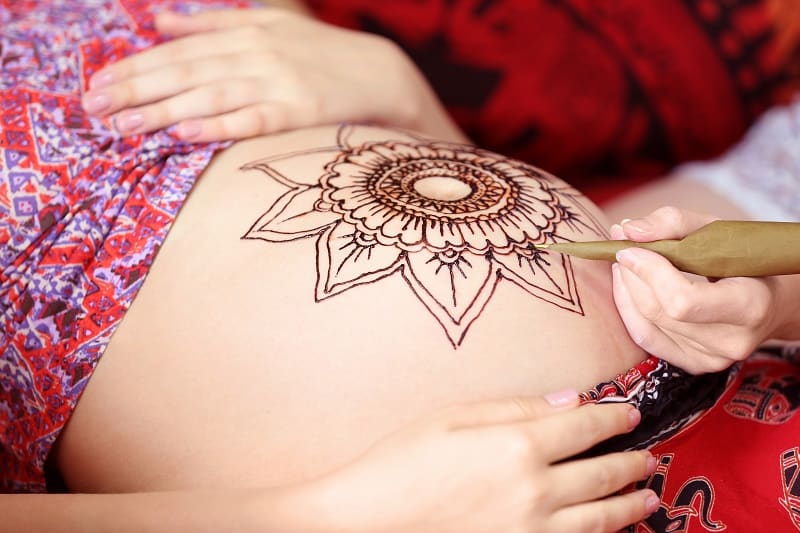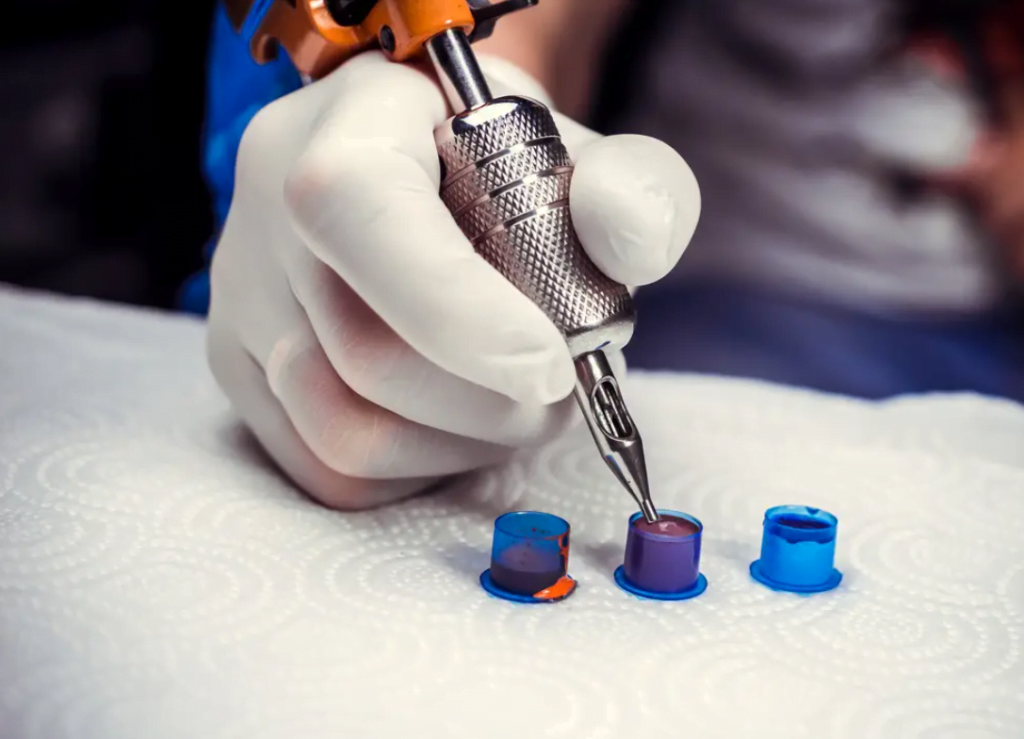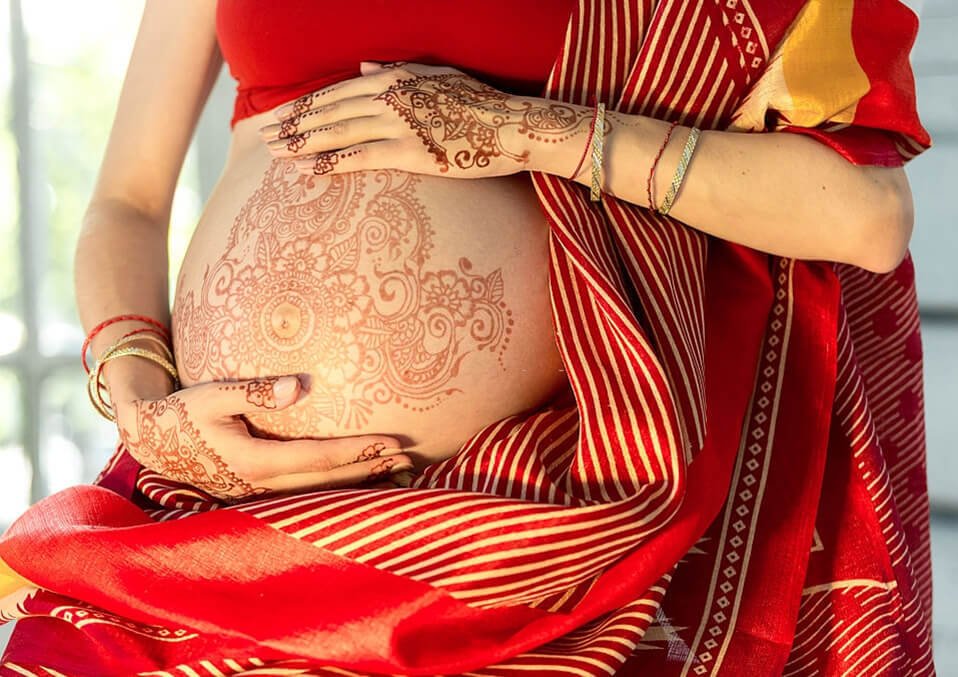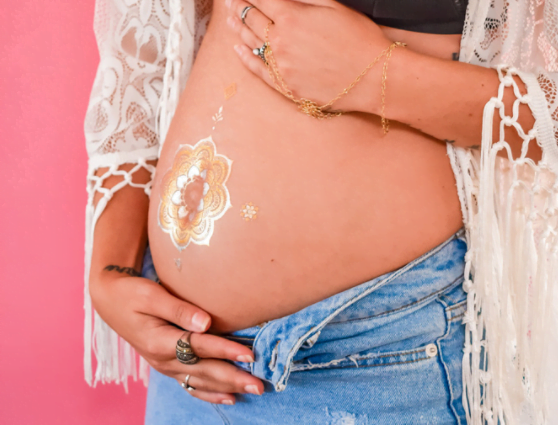When you’re a tattoo enthusiast and you find out you’re pregnant, one of the first concerns that come to mind is whether you can get a tattoo while pregnant. Of course, this is a valid concern because a tattoo is applied to your skin by entering pigments through punctures in the top layer of skin.
The last thing you want to do is endanger your baby. As a result, in this article, we’ll provide explanations to the most often asked questions concerning tattoos during pregnancy.
Make sure to read all the way to the conclusion to learn all you need to know, from the associated risks to the precautions and more.

Is it possible to get a tattoo when pregnant?
Pregnant women may have a tattoo while pregnant, but because there are risks, they may choose to wait until the baby is delivered. Indeed, the first three months are important for the baby’s organs, and any changes during this time could result in abnormalities and other defects that impact his development.
While the quantity of ink absorbed by the body has not been demonstrated to be hazardous to the fetus, doctors generally advise waiting until the second semester.
After this three-month danger period has passed, the likelihood of the tattoo affecting the baby is substantially smaller. As a result, tattoo enthusiasts could be tattooed with more peace of mind. However, it is still essential to take the necessary precautions because the risks are not confined to the paints used for drawing.
The Risks of Getting a Tattoo While Pregnant
Before you even consider getting tattooed while pregnant, you should do your own research about the risks and consequences. These could have an impact not just on your health but also on the health of your baby.
Infection
Infection is one of the most serious hazards when getting tattooed. If your tattoo artist uses infected or unsanitary needles, you could get bloodborne infections such as hepatitis B. A mother infected with hepatitis B can easily spread the virus to her baby during delivery. Babies with hepatitis B have a 90% probability of getting a lifetime infection, and one in every four will die as a result of health complications if the virus is not treated.

Unsterile tattoo needles can potentially spread blood-borne infections such as hepatitis C and the human immunodeficiency virus (HIV). A mother with hepatitis C has a 6% risk of passing the infection on to her baby. Without treatment, the chances of an HIV-positive mother infecting her child vary from 15% to 45 %.
Toxic tattoo inks
Despite the fact that the average tattoo needle is just 1/16 of an inch deep into the skin, some tattoo ink includes heavy metals such as mercury, arsenic, and lead.
These substances can be harmful to your developing baby, especially during the first trimester, when the major organs are forming. Heavy metal exposure can have an impact on your baby’s brain development. It may also raise your chances of miscarriage or stillbirth.
Tattoo Deformations
When you’re pregnant, your skin is continually expanding and transforming to make room for the baby within. Depending on where you receive your tattoo, your ink may not appear the same after you’ve given birth and healed.
Your skin might also alter in various ways. Melasma, or temporary darkening of the skin, and increased skin sensitivity are typical during pregnancy and might change the shape of your tattoo.
Epidural Injections
While research on epidural injections in tattooed women is limited, the hazards are fully recognized. In fact, obstetricians are cautious about providing an epidural injection in the lower back during labor.
According to the Mayo Clinic, the anesthesiologist will not inject the epidural in a tattooed part of your skin. This is owing to the possibility that injecting the epidural into tattooed skin could pump the chemical pigments deeper into the tissues, potentially causing harm.
Precautions to Take When Getting A Tattoo While Pregnant
Before arranging an appointment to get a tattoo while pregnant, do your research and pick a trustworthy shop. Many artists will not tattoo pregnant women, so make sure to notify the shop and your artist ahead of time to avoid any last-minute problems.
Here are some factors to take into account or ask to guarantee that you get tattooed safely:
- Make certain that the tattoo service you select is clean and reliable. Read internet reviews and speak with others who have had tattoos done there. Ask about their experiences and whether they had any issues.
- Check for any state laws and tattoo parlor regulations in the United States, and make sure the place you chose abides by them.
- Confirm with your artist whether any heavy metals are present in their ink. If it does, it’s better to wait until you give birth.
- Inquire with your artist about their sanitation procedures and how frequently they are performed. Autoclaves, or sterilization equipment, should be utilized in any tattoo parlor. In front of clients, sterilized packs containing needles should be opened.
- When you arrive, check the general cleanliness of the shop. Take note of any unsanitary elements, such as a muddy floor or an artist who is still wearing latex gloves. Wipe down surfaces on a regular basis.
- Take into account where you want your tattoo to be placed. Avoid having a tattoo on your stomach or hips. During pregnancy, the skin in certain areas expands a lot, which may cause your new ink to distort later on.
- To minimize infection and complications, take proper care of your tattoo and keep it clean afterward. If you see any indications of a rash or infection, consult a doctor.
What other options for pregnant women besides a tattoo?
Tattoos are a means for us to express ourselves, our aesthetic tastes, and our appreciation of specific things. Leaving a permanent mark on our skin can be recognized as a symbol of exquisite taste, which is why so many women love them.
Many women desire to leave an indelible mark on their skin when they become pregnant. For example, getting the baby’s future name, birth date, and other details tattooed. However, considering the risks involved, what are the safest alternatives?
Temporary Tattoo Marker
Drawing your own design using a tattoo marker is a terrific option if you want a safe and temporary alternative to actual tattoos.
Alternatively, some tattoo artists will accept to draw a stunning design on your skin that will gradually fade away and be completely erased. Needless to say, these will not do any harm and will pose no risks.
Henna
Women in Egypt, India, and much of the Middle East have been bringing “good luck” to their pregnancies for thousands of years by painting beautiful designs of henna on their pregnant bellies in the third trimester. According to tradition, henna would ensure safe delivery and a happy baby.

If you’re interested in this temporary alternative, keep in mind that there are several forms of henna. Natural, harmless henna stains the skin orange, red, brown, cinnamon, brick, chocolate, or coffee for one to four weeks. Natural, non-toxic henna does not come in black. You should make certain that the artist is using only natural ingredients and NOT black henna.
Anyone, pregnant or not, should avoid using black henna. Black henna includes para-phenylenediamine (PPD), a chemical that causes burns, blisters, and other reactions that can remain for months and is difficult to diagnose and cure. Consult your medical doctor if you have any concerns regarding an existing tattoo or henna.
Temporary Tattoos
Temporary tattoos, which can be drawn or glued to your skin, are a safe option. Depending on the quality, they can last from a week to two months. In addition, several globally renowned tattoo artists sell their own temporary tattoos for as little as $5.

Aside from being gorgeous, inexpensive, and safe, they can be readily removed and replaced with a new design in a blink of an eye.

